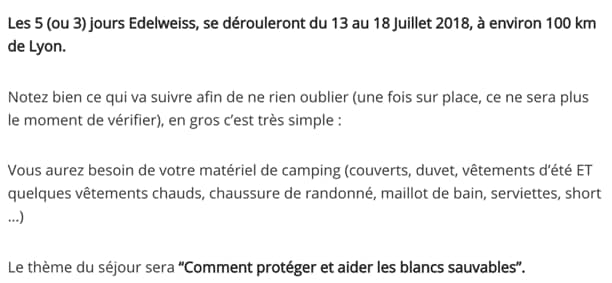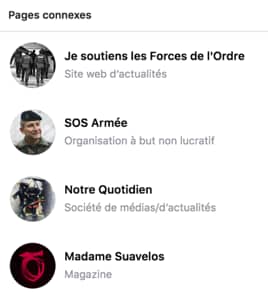In cooperation with French media Le Monde (in English here), the EU DisinfoLab helped expose a French white supremacist network that uses deceptive Facebook pages to attract visitors on their website to generate revenue from online advertisements, and sell racist products as a means to support their activities.
by Alexandre Alaphilippe, Roman Adamczyk, and Gary machado
Key takeaways from our study
- We uncovered a network of at least 16 Facebook pages hiding their white nationalist/white supremacist and racist views behind misleading names, calling users to support policemen, firefighters, or armed forces, and sometimes even victims of terrorism. On Facebook alone, these pages collectively reach an audience of 375,000 people.
- This extremist network, called Suavelos, is also very active on other platforms such as Twitter, YouTube, VKontakte, Minds and Telegram, promoting hate speech against non-white populations. It also organises summer camps for white populations, admitting to the use of a non-for-profit organisation to hide its illegal agenda, which facilitates its ability to be able to collect and redistribute money.
- We also uncovered some of their funding sources, from the financial incentivisation of web advertisements on their websites to online shops and direct donations.
- It is clear that many online platforms have failed to minimise hate speech by providing free reach to Suavelos’ content, especially through algorithmic recommendations.
- In parallel, payment and monetisation companies like PayPal, Google Double Click, Taboola or Tipeee also helped this network to raise funding. These platforms have failed to scrutinise their users and have been hijacked by Suavelos for at least one year. In doing so, the platforms have allowed this group to pursue its illegal activities.
- EU DisinfoLab believes that the Suavelos example illustrates how the techniques of social media amplification generate revenue while simultaneously fueling political deceit, anger, and even hate, which is a consequence of how social platforms are regularly hijacked to serve private and divisive interests.

Recommendations
In addition to the potential removal of these accounts, EU DisinfoLab considers that there are necessities to:
- Strengthen the transparency of ownership of similar pages/accounts used to falsely amplify the same content;
- Strengthen the transparency of automated content;
- Strengthen the scrutiny of online advertisement revenue with transparent processes, as well as enforcing liability and accountability of users violating terms of use.
A summary of our investigation
“I support the police”, “I support firefighters”, “I support healthcare workers”, “I support terrorism victims”, “Proud to be French”, “Stop violence against women”, are all names of Facebook pages that, at a first glance, seem to defend popular causes.
On the 27th July, the fact-checking team of the French news agency AFP published a tweet fact-checking a publication posted on the Facebook page named “I support the police”. This publication pointed to the domain news.suavelos.eu with an article titled “Rome, a police officer killed close to the Vatican after having been stabbed 8 times by two African migrants”.

The original story falsely attributed the death of the Italian policeman to “Two African migrants” when in fact the culprits were American tourists. After AFP’s fact-checking team fact-checked the story, the Facebook page “I support the police” deleted the publication from its feed.
It is interesting to note that the “About us” section of the Suavelos website claims that “Suavelos is a website dedicated to the rise of Occidentalism and communitarianism of white people”, aiming (among other things) to:
- “spread the idea that white people deserve their own land where they are at peace”;
- “fight the white people replacement”;
- “Cure the white ethno-masochism”;
To achieve this agenda, in 2017, 2018, and in 2019, Suavelos organised the Edelweiss camp, a gathering in the countryside exclusively for white people belonging to Suavelos’ network.

As described in the press, the first Edelweiss camp focused on activities such as knife and sword fighting, with the aim to train Übermenschen (in a clear reference to Nietzsche’s philosophy). For this year’s edition, in order to participate in the Edelweiss camp, Suavelos members were asked to confirm by email and pay €190 to participate.
As explained in a video, Suavelos is financially supported by a non-profit association designed to pool resources and fund community projects such as content production, training, or the funding of office rentals. The video also reveals that the association plans to fund more communitarian actions to develop “live zones inside and outside the country” in case of a “civilisation collapse”. Not to mention the association raised the possibility of funding a cash bonus for babies born within the Suavelos community, with the aim of sustaining “intra-communitarian natality”. At 2:10:16, it also stated that the deposit for the “summer camp,” i.e. the Edelweiss camp, was paid for by the association.
It is, thus, very clear that Suavelos uses Facebook and other platforms to amplify its message. In order to bypass the platforms’ community standards and keep their public pages active, Facebook pages such as “I support the police” are a good vehicle to spread a specific agenda without claiming to be racist. In looking back at this Facebook page, we followed Facebook’s algorithm for related pages and found suggested Facebook pages.

This is how we found other Facebook pages promoting Suavelos.eu content, which, for some of them, are designed with the similar “I support” pattern.



Moreover, we also found pages that re-shared the content of these Facebook pages with similar timestamps, which could indicate closeness or the same ownership of these pages.




These pages have all adopted a similar strategy to other far-right media by redistributing news in order to frame an agenda. In looking at these, the world in which we inhabit is depicted as follows:
- There are dozens of daily attacks on white people, always perpetrated by migrants or non-white individuals;
- A significant part of these crimes are sexual crimes against white women;
- There is absolutely no reaction from the public authorities or measures taken by them to mitigate these issues;
- This is endangering the “European” or the “occidental” civilisation, which needs to be protected.
These narratives are promoted through the posting of petty crime reports collected in the press and through far-right news aggregators such as fdesouche.com. They are then posted on Suavelos’ Facebook pages to attract visitors on Suavelos.eu.
In parallel, narratives also encourage and stimulate patriotism and the valorisation of occidental culture. The most iconic example of this strategy is the Occidental Beauties (Beautés Occidentales) Facebook page.


At the same time, in a more original tone, the “I like and I defend pets” Facebook page, created on the 5th June 2017, gathers pictures of different domestic animals and articles against animal cruelty. Whether they’re polluted by curry or are attackers against aggressors, animals are seen as victims of multiculturalism or defenders of the occidental way of life.


The sum of the community of these core Suavelos pages reaches 375,200 fans (with most certainly some overlaps).
| Suavelos News | 18,000 fans |
| Madame Suavelos | 5,000 fans |
| I support the police | 168,000 fans |
| I support our military | 12,000 fans |
| I support attacked firefighters | 1,300 fans |
| I support our healthcare workers | 2,500 fans |
| Stop violences against women | 3,000 fans |
| Stop hate against white! Stop violences against women! | 5,000 fans |
| I support victims of terrorism | 900 fans |
| I like and I defend pets | 24,000 fans |
| Vive la France | 13,000 fans |
| Let’s defend France | 98,000 fans |
| Our daily life | 10,000 fans |
| I am patriot | 8,900 fans |
| Occidentalism | 2,000 fans |
| Petition-Action | 3,600 fans |
| TOTAL | 375,200 fans |
This amplification strategy on Facebook is successful, as according to SimilarWeb figures, it attracts around 111,000 visits every month on the Suavelos.eu website.


By appropriating emotional causes to spread a very specific message, this strategy spreads the message that crime targeting white people committed by non-Europeans is rising, which is jeopardising the European civilisation. This is a result of what has been described as the economy of emotions. More specifically, “how emotions are leveraged to generate attention and viewing time, which converts into advertising revenue.”
Revenue through online advertisements can be achieved by different platforms through targeted advertisements, like Google Adsense or Doubleclick, or related and similar sponsored content, such as Taboola. Accordingly, Suavelos.eu uses both of these websites to display advertisements and consequently receives funding from such advertisements.


Once visitors are on the website supporting its advertisement revenue, Suavelos’ goal is to then turn these visitors into regular members of Suavelos network through donations or fees, or have them continue to support Suavelos. According to SimilarWeb, upon visiting Suavelos.eu, half of the visitors then visit one of the Suavelos’ social platforms. Their Telegram channels appear to be the most popular destination.

We also notice the presence of alabastro.eu, an online shop managed by Suavelos’ founders, which sells white nationalists t-shirts for the financial benefit of Suavelos.

The Suavelos network also has an extended use of other platforms such as YouTube, VKontakte and Twitter, as well as other web domains that serve narratives close to white supremacism and racism. Their creative use of other platforms such as Tipeee (also used to fund identarian group Generation Identitaire) as well as PayPal also enables them to receive core funding for their activities, which helps them to realise new development plans. In one of their videos, they clearly explain their target is “the 11 million people who voted for Marine Le Pen in 2017”, in a clear attempt to convert the French far-right into white nationalists.
If you’re interested in knowing more about Suavelos’ narratives, please read our full report.


